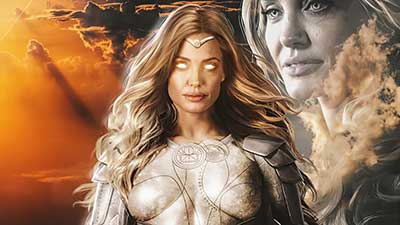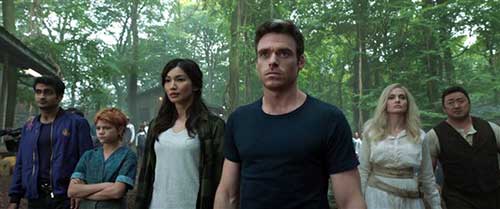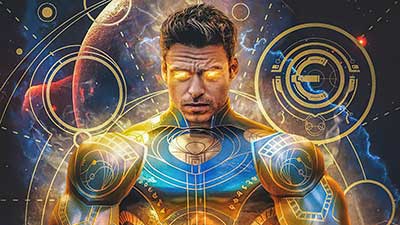Are the Eternals too Woke?
By Hervé St-Louis
September 3, 2021 - 10:48
 |
| Angelina Jolie as the Eternal Thena |
The Eternals were created by cartoonist Jack Kirby in 1976 as a follow up the New Gods whose series was cancelled by Marvel Comics rival, DC Comics. Kirby was interested in Judeo-Christian lore and at the time of their creation, was wrestling with philosophical and theological issues in comic form. When he returned to Marvel, he modified parts of the New Gods and the story of New Genesis versus Darkseid's Apocalypse. The Eternals were no longer part of a mythical new pantheon like the New Gods. Instead, they were angel-like creatures created by mysterious cosmic beings known as the Celestials.
After Kirby ended his run on the Eternals, without completing the story, another maxiseries was published by Marvel Comics in 1985. This series written by Peter B. Gillis and drawn by Sal Buscema and later completed by writer Walt Simonson and cartoonist Keith Pollard, the new series added more details to the Eternals’ lore, bringing the series within the Marvel 616 universe proper. From then on, many members of the Eternals would leave the confines of the Kirbyverse and mingle with the Avengers and many other Marvel characters. Ties were made between the Eternals and other Marvel groups such as the Titans.
In a sense, the movie appears to be playing with the longstanding question “where were you and why didn’t you get involved?” From the beginning of their appearances, the Eternals were not entirely part of the standing Marvel universe and only joined much later. Also, as first conceived, the Eternals were all white characters created by the Celestials. Jack Kirby had always been a defender of diversity but, unlike his work at DC Comics, he did not add much diversity to the cast of the Eternals, possibly because he did not complete his work there. It was up to other creators to add more diversity in subsequent appearances of the characters.
The most important comic featuring the Eternals since Kirby’s original series was volume three by writer Neil Gaiman and cartoonist John Romita Jr. Gaiman, a prolific and award-winning fantasy and comic writer, again played with the themes of the Eternals as being on the sidelines of the Marvel universe by featuring them as having forgotten who they were only to assume human lives, until the threat posed by the Dreaming Celestial and the machinations of Sprite, the Eternal who could not age out of his human body. It is with that series that the Eternals at Marvel became the type of series only handled by top creators who could add to their rich lore.
 |
Thus Kevin Feige seems to be pushing the Eternals movie in the same direction, drawing from the perpetual sidelines status of the team while elevating them with storytelling and cinematography that is beyond the usual MCU film. Academy-award winner Director Chloé Zhao was given much more control over the film than other directors. Therefore, this film seems more like a tale that would fit next to Zack Snyder’s Justice League, than the Avengers. But at the same time, the Eternals are completely embedded within the core stories of the MCU.
The Eternals are much more diverse, and many changes were made to several characters. The gender balance in the team presented has an equal number of men and women. Gender minorities are also present. Many of the Eternals are racialized, although there continues to be a plurality of white characters. Had Feige and Zhao used actual world population statistics, there would have been far more Asians and Desi characters.
While I do not want to dismiss the concerns of fans who claim that the Eternals are woke representative of Hollywood’s goal of diversifying, one has to ask where should they start? The Eternals are not the most well-known characters in comics. They do not have a cult following. Changing them is fair game. Ajak is now a motherly figure, played by actress Salma Hayek, a Hispanic woman. Two Eternals featured in the film were not created by Kirby. They are Kingo (Kumail Nanjiani) and Phastos (Brian Tyree Henry). Each has not been a prominent member of the team in the past. Kingo is no longer Japanese but a Indian. Phastos is still black but now is also gay. There are many martial arts Asian characters in the Marvel universe, but very few Indians who draw on Bollywood’s ethos. Revealing Phastos as gay is the least risk that Marvel Studios could take with one of its characters. Phastos has had less than 80 appearances in comics.
Other changes include making Sersi Asian (Gemma Chang) and changing Sprite’s gender. Sprite apparently switches gender in comics now. Sprite, one must remember, is a Peter Pan-like character. I admit to thinking that Sprite was a boy when I saw the first trailer. I like how Marvel is playing with Sprite’s gender. The actress Lia McHugh seems gifted and very lively. I can’t wait to see her crack jokes and make pointed observations in the film. She has the essence of the original character. Gilgamesh could have been Arabic but instead, Zhao and Feige cast Korean actor Don Lee.
The major change that has drawn attacks from some fans is the Eternal speedster Makkari. Makkari is played by racialized woman Lauren Ridloff. Makkari was an important character in the comics, being created by Jack Kirby and playing an important role in the Gaiman and Romita series. Ridloff also will play Makkari as a deaf character, much like herself. Her inclusion, despite her talent, has drawn many attacks from some fans that Marvel is trying to cover all of its woke bases.
 |
| Richard Madden as the Eternal Ikaris |
Eternals promises to have Game of Thrones level drama. It will be epic, with love hate, betrayal all playing a part in the introduction of these characters to the MCU. Crafted by the Michelangelo of comics and perfected by Shakespeare of comics, this material can only shine in film.
Related Articles:
The Eternals' Sersi
The Eternals' Druig
Eternals Movie Review
The Eternals' Kro
The Eternals’ Ikaris
The Eternals' Makkari
The Eternals' Sprite
The Eternals' Kingo
Are the Eternals too Woke?
Eternals #9
